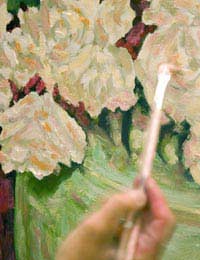Producing a Finished Work

Whilst starting a work can be difficult, finishing can be equally tricky, demanding a level of awareness that can often leave a budding artist flummoxed! Often knowing when and how to finish a work sets an inexperienced artist apart from an experienced one.
Problems Surrounding Finishing an Artwork
There are principally two main mistakes when approaching finishing an artwork - finishing too soon and not knowing when finishing would be a good thing. In the first case an artist will be over content with their result and fearful of pushing through with their work to a stage beyond what comes most easily. In the latter case the artist will not realise when they are on to a good thing and will push the artwork too far, erasing the traces of the original picture and overworking it so as to ruin it.In both cases it is a good idea to have a clear objective in mind and to work to fulfil that objective. Certainly, chance can play a part within an artwork, but it is best practice to have a clear intention of the outcome you want, so that you can work to that point and no further.
Returning to a Work
When you have gained in experience and become more ambitious you might consider reworking some of your old 'finished' pieces. This seems to go against the advice given, but it is true that the benefit of hindsight allows changes to be made over time, as with the case of Picasso's groundbreaking Les Demoiselles d'Avignon, which was reworked over a few months. This only works insofar as you still employ constant revisions to achieve a certain effect, and not blindly for the sake of it.Often these revisions will be apparent in the finished work and will contribute to the feel as a sort of 'labouring' effect. However, one would need to engage in this kind of reworking of a work over time knowingly and with intent, rather than haphazardly!
Going over and over a drawing, for example, may enable the artist to avoid the pitfall of leaving the work in its early stages, before it is really ready to be termed as a finished piece. It may however, result in the work being over managed, resulting in a brown mess of paint or a grey fog of a drawing that is beyond redeeming. That is why experience is the best assurance that work can be finished appropriately and to a reasonable standard.


Re: Contextualising Your Work
Dear Mr Watson, I have been working relentlessly for 40 years through Art, writing, performance based expressions in theatre, dance,…
Re: How to Sell My Paintings and Drawings?
Hi , I would like say about my cousin that he live in Afghanistan and he is fabulous in art painting and doing job…
Re: How to Sell My Paintings and Drawings?
Amy - Your Question:Hi I have just left school and I love to draw I do pencil work and I would love to sell my…
Re: How to Sell My Paintings and Drawings?
Hi I have just left school and I love to draw I do pencil work and I would love to sell my drawing but I don't no how…
Re: How to Sell My Paintings and Drawings?
Hi, I have 3 drawings the information as follows: 1- Salvador Dali (Spanish Draftsman). Is 24x19 cm. 2- Pablo…
Re: Freeing Yourself Up
I love drawing so much and I will like to be one of the best artist in the world
Re: How to Sell My Paintings and Drawings?
anna-81 - Your Question:Hi, I need help how can I sale my paintings and drawings and I want to know if my work is…
Re: How to Sell My Paintings and Drawings?
Hi, i need help how can i sale my paintings and drawings and i want to know if my work is really good or not. I'm…
Re: How to Sell My Paintings and Drawings?
i want to sell my drawing give me the idea.
Re: How to Sell My Paintings and Drawings?
I am 15 years old and i would like to sell my pencil drawing